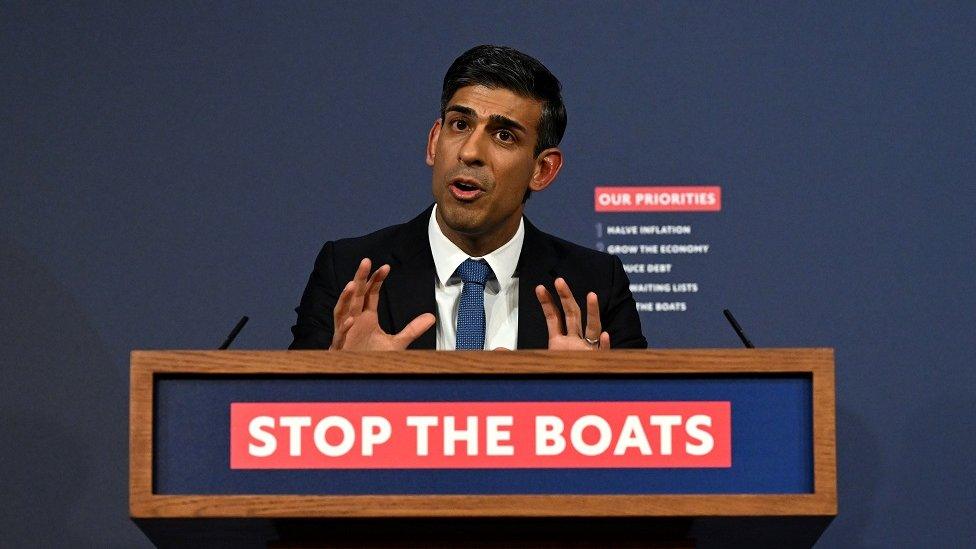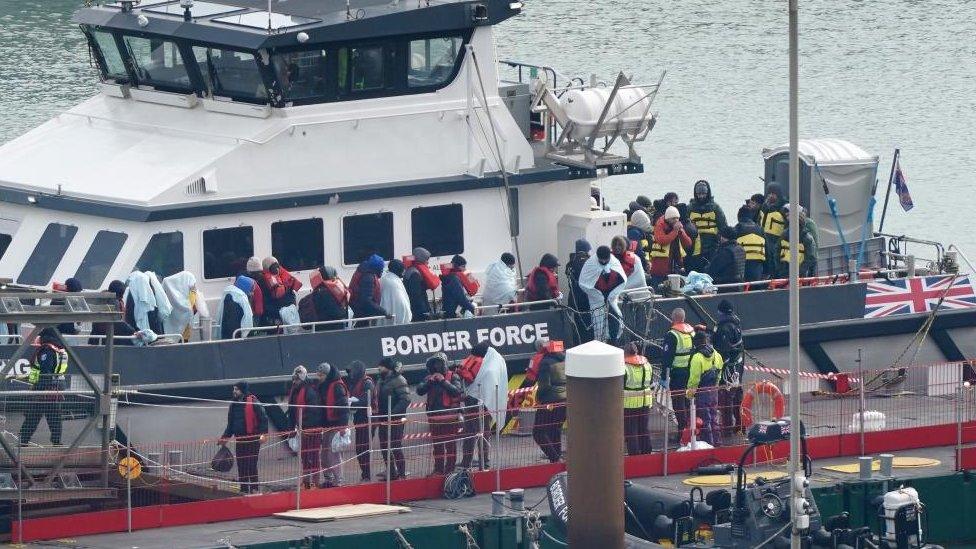Rishi Sunak: Hurdles in the race to pass Illegal Migration Bill
- Published

Rishi Sunak is in a race against time to deliver on his promise to stop small boats - with new legislation likely to run into opposition both in Parliament and the courts. Here is how the battle could play out.
The prime minister has outlined five key priorities for 2023, and one of them is to "stop small boats" crossing the Channel.
Ministers have published legislation that they believe will do just that - the Illegal Migration Bill. But bills, especially controversial ones, can take some time to become law.
And with a general election likely in 2024 the prime minister is up against the clock when it comes to reducing the numbers.
Getting the bill through the House of Commons is the easy part. Rishi Sunak has a large majority there, and his MPs will gladly back him on this issue.
Labour insist the plans are unworkable, and the SNP question the morals behind the policies, but their opposition will not prevent the legislation clearing the Commons.
Things could get trickier in the House of Lords.
The second chamber is likely to want to make amendments. Their changes would then go back to the Commons for consideration.
Sometimes legislation can go back and forth multiple times, a situation known as "ping pong".
How long could this go on for?
Well, to take a recent example, the Nationality and Borders Bill, the government's last migration legislation - passed less than a year ago, with a promise it would tackle the smugglers - took almost five months to become law after entering the Lords.
Legal challenges
Those in government feel that getting the Illegal Migration Bill passed by the summer/autumn would be the best case scenario.
Whenever that happens there will probably still be hurdles for the government to overcome.
Ministers want the law to apply retrospectively, but if it is going to discourage people from taking small boats, the central elements of the bill need to quickly act as a deterrence to anyone who would be heading to France.
Ministers want to detain anyone who arrives via boat for at least 28 days, before subsequently removing them to another safe country.
Firstly, does the Home Office have the capacity to detain those who arrive? And will the home secretary order Border Force officers to literally round up everyone who has arrived since 8 March, when the bill was presented to MPs?
There is plenty of scepticism about whether the space to do this exists.
Secondly, does the UK have the necessary agreements with other countries so that asylum seekers can be sent elsewhere?
There is a deal with Albania when it comes to returning Albanian nationals. There is no agreement to send people back to the EU because the UK voluntarily left the previous arrangement as part of Brexit.

So if it's not possible to send someone back to their home country because they could be killed or harmed, or to the EU, the plan is to deport them to another safe country - such as Rwanda.
But the Rwanda policy is stuck in the Court of Appeal. Even if judges ruled by the summer that the plan is lawful, the Supreme Court may still need to look at it - meaning there might not be a green light from British judges before the end of the year. And so, no-one has been sent there.
Even then, individual migrants might still have a right to petition the European Court of Human Rights in Strasbourg if they can show that a decision to put them on a plane to the African nation breaches safeguards guaranteeing fair and safe treatment.
While these issues remain unresolved, it's hard to see a scenario where the numbers making the journey drop considerably.
That's because lots of people who pay to be smuggled to the UK are told by others in the country - and by the gangs - that they're unlikely to be forced to leave the country.
And speaking of legal challenges, the Illegal Migration Bill will inevitably face these once its parliamentary journey is complete because the government has admitted it is potentially fatally flawed.
Monumental challenge
On the first page of the bill, external, Suella Braverman has been unable to given the the standard formal guarantee to Parliament that the plan is compatible the European Convention on Human Rights. And in a letter to MPs she admitted it had "more than a 50% chance" of being found to be unlawful.
One detailed background document shows why, external. Officials have told Parliament the bill potentially breaks eight fundamental rights - including the home secretary's duty to protect people from being killed and to prevent inhumane and degrading treatment.
The briefing says the legislation could lead to people being locked up without justification, children and parents being separated and others being the victims of general discrimination.
If the home secretary succeeds in locking people up for 28 days - but then doesn't transport them elsewhere because there are no agreements with other countries - then each of these migrants is entitled to ask a judge to release them because it's unlawful imprisonment. The government seems to suggest this won't happen - but 86% of people detained in 2021 were released because the government had no foreseeable likelihood of putting them on a plane, external.
And the potential legal battles don't end there. The bill explicitly tries to ban migrants from using the Human Rights Act to challenge their detention and removal from the UK.
But...if that ban makes it through Parliament, it can't stop people taking their case to the Strasbourg court instead.
That's why Sir Jonathan Jones KC, the former top government lawyer advising ministers on how to make ideas workable, has described the bill as "rather desperate" rather than thought-through, external.
In promising to "stop the boats", Rishi Sunak has set himself a monumental challenge.
He believes progress in this area means people will be discouraged to make the journey, and therefore the number of boat journeys will drop.
Ministers believe that the plan will work after taking advice from Australian policy makers who implemented something very similar.
All of this has to happen within a timescale that allows Mr Sunak to point to proof of success before the next general election.
In many ways, the prime minister is keen to keep the boats issue in the spotlight. The Conservatives are traditionally more comfortable talking about borders than Labour.
But he's set an expectation that things will change. Making such a big pledge is the easy part. Delivering will be hard.
It's a difficult problem to tackle, and he could be setting himself up for failure. His calculation is that progress could deliver significant political rewards, and therefore it's worth the risk.

Read more about Channel migrant crossings
